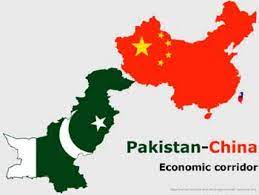 Pakistan’s ability to maximize the benefits of the China-Pakistan Economic Corridor (CPEC) hinges on the formulation of a practical and inclusive industrial policy. The success of CPEC in fostering Pakistan’s industrial development necessitates a strategic approach that actively involves stakeholders, particularly those from medium and small industries. Without a comprehensive policy framework addressing the needs of a diverse industrial landscape, the nation may fall short of fully capitalizing on CPEC’s transformative potential.
Pakistan’s ability to maximize the benefits of the China-Pakistan Economic Corridor (CPEC) hinges on the formulation of a practical and inclusive industrial policy. The success of CPEC in fostering Pakistan’s industrial development necessitates a strategic approach that actively involves stakeholders, particularly those from medium and small industries. Without a comprehensive policy framework addressing the needs of a diverse industrial landscape, the nation may fall short of fully capitalizing on CPEC’s transformative potential.
As Pakistan navigates the transformative corridors of CPEC, the wisdom of inclusive industrial policies becomes paramount. The journey towards sustainable progress echoes the sentiment that a nation’s strength lies in empowering every facet of its economy. With this in mind, a pertinent question arises: Can Pakistan truly harness the full potential of CPEC without a well-crafted industrial policy that actively involves stakeholders, especially those from medium and small industries.
A critical examination of the committees overseeing CPEC’s industrial policies becomes imperative. How can the composition of these committees be scrutinized to ensure diverse representation, particularly including stakeholders from medium and small industries, fostering an inclusive approach to decision-making?
In the pursuit of transformative change, there’s an inherent risk of bias. How can CPEC strike a balance to ensure that industrialists, benefiting from the current system, do not resist reforms that might disrupt their positions, and how can diverse stakeholder interests be accommodated?
Considerations must extend beyond immediate gains. In the intricate web of CPEC, how might we ensure that the lens through which industrialists view their involvement doesn’t solely focus on the gains of their enterprises? Instead, how can it broaden to encompass broader socio-economic considerations—such as ensuring fair resource distribution, prioritizing the welfare of workers, and championing environmental sustainability?
The historical imbalance in Pakistan’s industrial landscape is a challenge that CPEC must confront. How can policies be crafted to rectify historical disparities where large industrialists have thrived, leaving smaller enterprises struggling, and how can the inclusion of diverse stakeholders be a driving force in achieving a more equitable distribution of benefits?
A comprehensive analysis of the committees responsible for overseeing the industrial policies within CPEC is of utmost importance. It is essential to scrutinize the intricacies of how these committees are structured and operate to guarantee a fair and effective decision-making process. In seeking an answer to this question, the wisdom of iconic industrialist Henry Ford reverberates: “Coming together is a beginning; keeping together is progress; working together is success.” The essence of this quote encapsulates the essence of our inquiry. It underscores the importance not just of assembling diverse perspectives but of ensuring their continual inclusion and collaboration, fostering a synergy that propels us toward genuine success.
As we envision the committees overseeing CPEC’s industrial policies, we must view them not merely as bureaucratic entities but as dynamic hubs where the collective aspirations of a nation converge. Inclusive decision-making, where the voices of both large and small industries are harmonized, paves the way for a transformative journey. The success of these committees lies not just in their composition but in their commitment to maintaining a vibrant, ever-evolving collaboration that mirrors the diversity and dynamism of Pakistan’s industrial terrain.
The journey toward comprehensive and inclusive decision-making within CPEC is a journey toward unlocking the true potential of Pakistan’s industries. To echo the sentiments of Nobel laureate AmartyaSen, “Inclusive development is possible only when we foster the capabilities and participation of all individuals.” It is in this spirit of fostering capabilities and participation, especially from medium and small industries, that the committees overseeing CPEC’s industrial policies can truly become architects of transformative change. As they navigate the intricacies of decision-making, let them be guided by the understanding that true success lies in a collaborative and inclusive journey toward a more prosperous and harmonious future.
This scrutiny is indispensable for fostering an inclusive approach to decision-making, ensuring that the diverse needs and interests of all sectors within the industrial landscape are considered and addressed. This review is essential for ensuring fair growth. It means recognizing and considering the contributions of different industries, no matter their size, when creating the overall industrial plans for CPEC.
As Pakistan confronts challenges in its industrial landscape, there arises a critical necessity for substantial reform, aligning with China’s commitment to fostering progress and innovation. How can committees involved in CPEC navigate complexities without being encumbered by the fear of disrupting the status quo, and how can an inclusive policy approach be the cornerstone for meaningful and sustainable change?
Examining global examples from places like Vietnam, Bangladesh, South Korea, Ethiopia, and Colombia sheds light on how committees unafraid to challenge established norms have propelled significant progress, and what lessons Pakistan can glean from these instances to ensure that its current initiatives become a catalyst for genuine and lasting industrial advancement. Reminding again that the success of Pakistan in harnessing the transformative potential of CPEC lies in the formulation of a practical and inclusive industrial policy. As the nation embarks on this crucial journey, the path to progress demands a collaborative approach that actively includes stakeholders from medium and small industries. Only through such an inclusive strategy can CPEC evolve into a catalyst for genuine and sustainable industrial progress in Pakistan.
[The writer, serves as Secretary General of the Pakistan China Friendship Association’s Khyber Pakhtunkhwa chapter. With a passion for fostering international bonds, he also lends his expertise as a Senior Media Consultant based in Peshawar, can be contacted through [email protected].]



